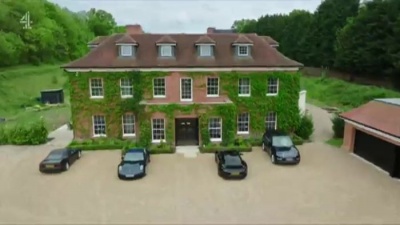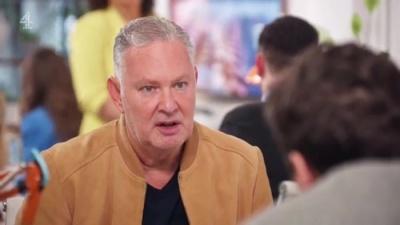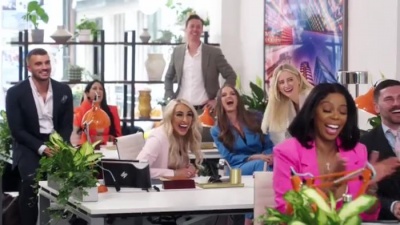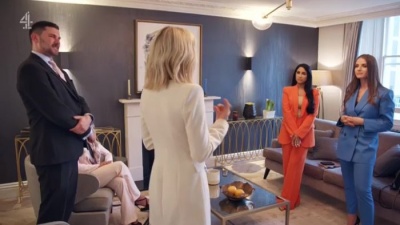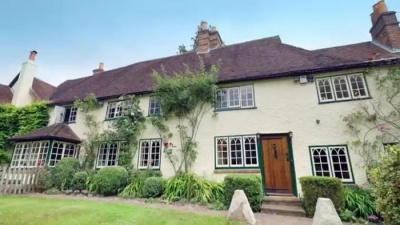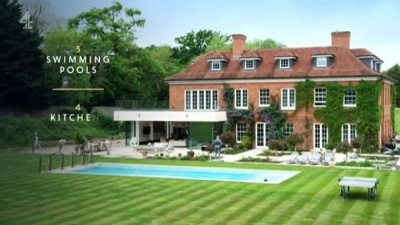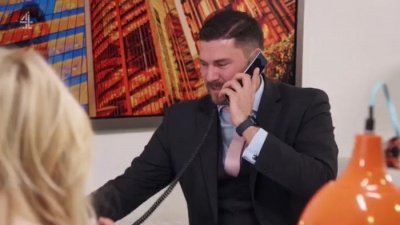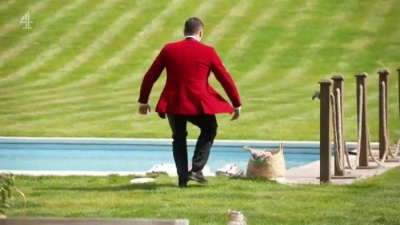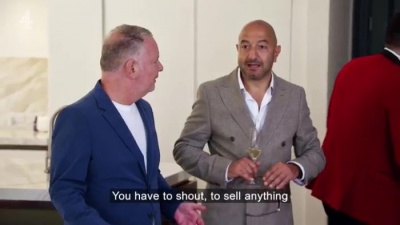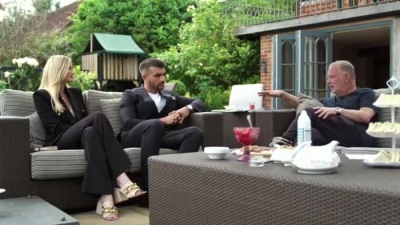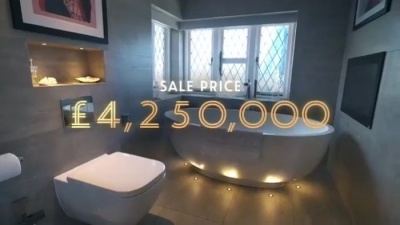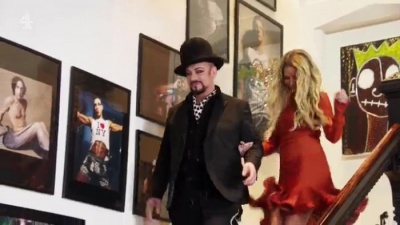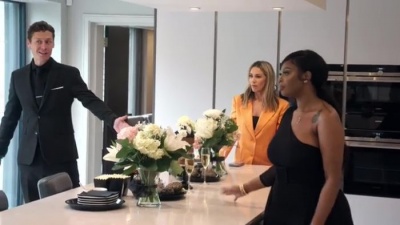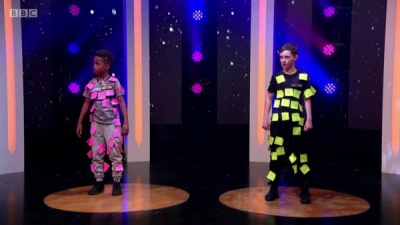Weaver's Week 2023-10-15
Last week | Weaver's Week Index | Next week
Who would watch a show like this?
Contents |
Selling Super Houses
South Shore for Channel 4, 29 August – 3 October
This column treads where viewers fear to go. We watch the shows literally nobody else watches, and often find some merit in them. Dianc on S4C, a taut adventure thriller. Cooking With the Stars, a cheap way for ITV to fill their schedules, and does enough business for the sponsors. The Time it Takes: my timers, your choice.
Which brings us to Selling Super Houses, the reasons for its failure are more interesting than the show itself.
What's the show about? With a name like Selling Super Houses, it should be pretty obvious.
Paul Kemsley (calls himself PK) is the host, voiceover man, challenge mentor, lead judge, and employer. According to his biography, Kemsley made his money through property speculation and land trading, and lost his money in the financial crash of 2007-10. As a friend of Alan Sugar, Kemsley appeared on BBC2's business satire The Apprentice, until his personal bankruptcy made his position untenable.
After declaring himself bankrupt in 2013, Kemsley moved to America with his wife Dorit. There, he reinvented himself as a celebrity manager, taking on convicted criminal "Boy" George O'Dowd, and singer Lulu. He's a regular on The Real Housewives of Beverley Hills, which is a bit like Made in Chelsea only sunnier. Kemsley is the co-executive producer of this show, alongside Jonathan Shalit (of the Inter Talent Rights Group).
And now he's over here, on our telly screens. Whoever he is.
Selling Super Houses began life in early 2022, with a loud press release. According to the blurb,
- Selling Super Prime, a new property show coming to Channel 4 later this year [2022], will showcase the UK's most exclusive properties as estate agents compete against each other to get a sale over the line.
- Melanie Leach, Executive Producer for production company South Shore, says the series promises to be "an intoxicating mix of super luxe properties, rich reality and cutthroat competition".
- PK and fellow super prime agent, Becky Fatemi of estate agency Rokstone, will offer eight incredibly ambitious Brits the chance to hit the big time. While making money and closing deals will be central to the competition format of the series, it won't be your conventional high street estate agents. The brokers will have some of the UK's most exclusive properties at their fingertips, bringing a whole dose of Beverly Hills luxury to London.
- PK is opening the ultimate London agency and will stop at nothing when it comes to hiring the very best sales team the country has to offer. The eight wannabe brokers will compete against each other in the cut-throat world of multi-million pound real estate. Juggling demanding clients, uniquely British sales tactics, PK's expectations, and the drama of having to make deals, they will do whatever it takes to get sales over the line."
This would be a programme, quite competitive, in the vein of ITV's oh-so-successful Tycoon. It's very different from the programme we saw. For starters, Rokstone were conspicuous by their absence, and the candidates worked for Robert Irving Burns agency (Arr-eye-bee on the programme). Kemsley owns half of RIB, and is one of their directors; his co-owner, Antony Antoniou, has some brief cameos. The name changed quite late in the edit – the first episode kicks off with a 90-second summary from Kemsley, and concludes "….which of them has what it takes … to sell … super prime".
They're selling...
Eight trainees were taken on board, and given a series of property challenges. All of the challenges are to help sell houses. Not just your common two-bed semi in a postwar housing estate. No, these are seriously expensive houses. People live in places that cost £3 million, £5 million, £20 million.
People buy and sell houses for these obscene sums of money, and 2% of the purchase price goes to the estate agent. When our trainee sells a house for £20 million, that's £400,000 straight into the pocket of RIB: ten years' average salary for one worker. More than enough to justify the seller's fees, and Kemsley will cream off some of that money because capitalists gonna capitalist. Kemsley is joined by Lonnee Hamilton and Thea Carroll, two experienced "real" estate agents – they're his eyes on the ground, report back on what happens when Kemsley is not around.
To help the audience understand what Kemsley is talking about, the contestants are sent to two of the seriously expensive houses on RIB's books. There, Hamilton or Carroll explains how the house can best show off the astronomical price tag. They don't mention why the house is "worth" so much: that's the job of Channel 4's other show Location Location Location, and of 2025's The Great Asset Price Bubble hosted by Coral Butterhead and Kayle Savoy-Bok.
Kemsley has set the contestants a challenge: have an open house. It's a party at a desirable residence, show off the house to people who might be tempted to splash out and buy it. "The important thing is to remember you're here to sell the house. Think of this place as a brand," says one of the experts. "Think of how you'll make this different from other instructions, think about how you'll establish an emotional connection."
All sage advice. And, of course, all forgotten by the contestants. We viewers are privy to what Paul Kemsley thinks is most important, which isn't what the contestants will have picked up on. We're setting the contestants up to fail.
And then they really set the contestants up to fail. Three swimming pools, 20 acres of grounds, sixty zillion toilets, one helipad, and an asking price of £20 million. Twenty million quid. They're going to stage an "open house" to try and present this to potential buyers.
Our contenders are split into four pairs. The pair in charge of the guest list work through their own contacts list, and ask for no help from anyone else. The pair in charge of entertainment hog the budget, and book two acts – a jazz band and a contortionist. The pair in charge of props do consult with the rest of the contestants, and are told that they can only get three of the four props they wanted. And there's a pair in charge of food.
The budget is a ludicrous £2000. One per cent of one per cent of the house's price tag; perhaps that's because the house is only available to the one per cent of the one percent. Kemsley tells us that he wants the contestants to hustle, call in a few favours, try and get things a bit cheaper than the shelf price.
Inevitably, the whole thing is a fiasco. Having blown half of the budget on performers, there's not much for flowers and decorations. The team haven't had sight of the house, so don't know how much work they've got to do to make the place look festive and welcoming. It's a lot more work than they think, and inevitably they aren't quite complete when guests arrive.
The handful of props are scattered around the grounds, it's almost a treasure hunt to find them. The sellers might have tried to have a Roaring Twenties theme, but it's quarter-hearted and almost worse than nothing. Food and drink are fine, and the contenders do begin to gather – but the band are so blimmin' loud that the agents can't schmooze and sell the place.
And, in the coup de grace, the windbreak behind the outdoor bar is blown over by the wind. Sums up the day. Sums up exactly what the producers wanted to happen, what they've gently engineered towards.
In later episodes, they conduct a house tour at a celebrity mansion. Oh look, it's Boy George's pad. Who was it that managed George these days? Later episodes contained a video tour, networking lunch, elevator pitch, and so on and so on. Jonny Coller and Ed Phillips' development work was not wasted, but it never struck us as particularly original. If you'd asked us to script out a series selling expensive houses, we'd have gone for "something they'll fail at", "video stuff", "a bit of showbiz", "elevator pitches", "interviews", "identical houses", and "a big budget finale". The precise details are where the production company earns its crust.
We'll scoot through to the final episode, where the four remaining candidates do all the work: videos, dressing a house, making brochures, showing people around, presenting – the lot. Although it doesn't go perfectly, the contestants are able to spot what needs improvement, and little that Kemsley says is surprising to them. In the event, he chooses to disrupt the rules of the industry and the game show – Pam and David emerge as joint winners.
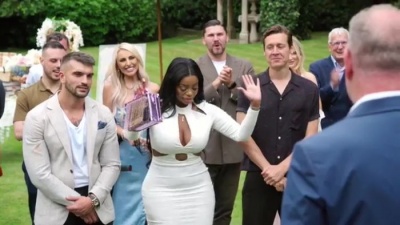 Pam's in the white dress at the front, David in the black shirt to the right. Such was the quality of this show that they didn't give us a two-shot of the winners on their own.
Pam's in the white dress at the front, David in the black shirt to the right. Such was the quality of this show that they didn't give us a two-shot of the winners on their own.
… but nobody's buying
Viewing figures were execrable. Overnights were reported at 420,000, and seven-day consolidated ratings reached the giddy heights of 537,000. To put that in context, it's half of what Murder Island and Make Me Prime Minister got in comparable spots in the last two years. In fact, we think it's the lowest rating of any show at Tuesday 9pm on Channel 4 since the start of 2020 – though our records are not complete.
"More Selling Super Houses at 9pm next Tuesday," claimed the announcer. Make than 10pm, where it staggered to 355,000 viewers. Live football occupied the next Tuesday, so our show shuffled across to Wednesday, and lost even more viewers. At this point, Channel 4 threw in the towel, and stuck the remaining episodes online so both viewers could see the final when they chose.
What went wrong? Quite clearly, the show didn't connect with the audience at all. It was a confused mess – are we meant to be gawping at the hugely expensive houses we'll never be able to afford? Are we meant to identify with the contestants, who all seemed remarkably pleasant to be around, proper human beings. Paul Kemsley might be known to the people who watch Real Housewives of Beverley Hills, but how many of those viewers will chance upon a Channel 4 programme?
Why should we care about Kemsley's project? A Nice House Somewhere In The Country is a daytime success because it's relatable: almost any adult viewer can imagine what it would be like to live in a place like this, and can put themselves in the featured couple's shoes. Selling Super Houses confused prices with phone numbers, it was too far removed, too far distant from normal viewers' experiences.
Perhaps we could forgive this distance if the show was clear and well-considered. But Selling Super Houses was not clear and well-considered, the pre-release bumph did not match up to the show we saw on screen. Promotion was for the show the production company thought they'd made, and not for the show they'd actually made.
Worst of all, it wasn't exactly clear what Kemsley wanted to do – was he here to disrupt the property market, was he here to find the best new estate agent for his established business? Either of these has the potential to make an interesting series; the combination led to a confused show, and confused shows make for unattractive viewing. The result, sadly, was a programme that flopped, and flopped hard.
It wasn't all bad, Selling Super Houses had heartwarming moments of generosity, and moments of high entertainment. But nobody watched them, and nobody cared for the outcome. The show ends with a hook for the next series, following Pam and David and their boss Paul; we'll never see that series, and we won't miss the opportunity.
Channel 4 has a remit to be experimental, to take risks with its programmes. Some of these experiments will fail, and we don't blame anyone for this. What lessons can we learn from Selling Super Houses?
1) Make sure everyone involved with the show knows their one goal. Selling Super Houses tried to be a documentary about disrupting an established market, and a recruitment show, and while walking the tightrope between these two stools, it plummeted to earth.
2) Your talent is less well known than you think it is. Before researching our article, this column had no idea who Paul Kemsley was; the name rang bells from somewhere, but we never cared for where. Selling Super Houses said, "Here's the star of a show nobody watches! Come see him do stuff!" and then wondered why nobody followed.
3) Never be afraid to cut your losses, and always give as much notice as possible. Channel 4 were right to move the series out of 9pm after one episode, and to abandon it when figures remained depressed. And they amended the EPG with proper speed, let linear viewers know what was happening.
4) Don't let a loud jazz band play indoors.
In other news
Genius move ITV will make a local series of The Genius. The series, originally made in Korean between 2013 and 2015, is a combination of strategic thinking, social skills, charm, charisma, lying, maths, out-of-the-box thought, and much much more. All the players are reported to be clever, and most are celebrities – high-flying lawyers, telly reporters, tech "bro"s, the local equivalent of Ariana Grande.
Our friends at Bother's Bar swear by the programme, and were part of a concerted effort to sell The Genius to a broadcaster on these shores circa 2015. But ITV were more likely to be convinced by the Dutch version from last year, or Remarkable Entertainment's commissions for Danish, French, and Norwegian versions.
The order is for eight episodes, to go out somewhere on the ITV family of channels and players. No, we don't have any clue about how one might apply to be on the programme. The producers of the original show have moved on, The Devil's Plan is on Netflix for those who subscribe.
In other news for the intellectual, a new series of Hey Duggee, and new spin-off show Hey Duggee's Squirrel Club.
Stickly Come Dancing Remember the great Crackerjack revival of 2020? When they invited young people to shake sticky notes off their body?
Keshet International has come up with a reverse programme. Stuck! gets its grown-up contestants into velcro suits, and try to collect as many notes and tokens as possible. But there's a danger, part of the set will trap the contestants until they're bought back by their team – and we can be sure that'll cost a time crystal or two. Stuck! is still a paper format, it hasn't been made in the studio just yet, but we're interested to see it happen.
Quizzy Mondays
Lincoln Oxford won University Challenge, bettering King's London by 225-65. Star buzzer Mehmed Tatoğlu took eight starters, at one point looked set for double figures. King's had actually taken a 25-0 lead, but looked lost at half-way. UC continues to pay occasional tribute to its own history, this week with pieces of classical music premiered in 1962, like the show. Lincoln buzzed well, but converted less than half their bonuses – they could well be vulnerable in the next round.
Paul Judge won Mastermind, taking the Life and Career of Magic Johnson as his specialist subject. An unusually large number of passes this week, nine in total, which is about six more than the rest of the series.
Gunners booked the first quarter-final slot on Only Connect, beating the Stitchers 25-13. Not really as close as that, the difference came on the walls, where the Stitchers got confused between coasts, shades of blue, and rebellions. We'll raise eyebrows at a sequence depicting the lyric of "House of the rising sun", a po'boy sandwich stood in for a generic picture of a poor boy.
This week, we've a new series of Wales' Home of the Year (BBC1 Wales, Mon). There's an unseen ep of Jon & Lucy's Odd Couples (C4, Fri) with Jon Richardson and Lucy Beaumont. Be careful – Bake Off moves to Wednesday this week, and it's the final of The Fast and the Farmer-ish (BBC3, Sun). Hear the BBC's Junior Eurovision Song Contest on The Zoe Ball Breakfast Show (Radio 2, Thu).
Pictures: South Shore, BBC Children's and Families
To have Weaver's Week emailed to you on publication day, receive our exclusive TV roundup of the game shows in the week ahead, and chat to other ukgameshows.com readers, sign up to our Google Group.


